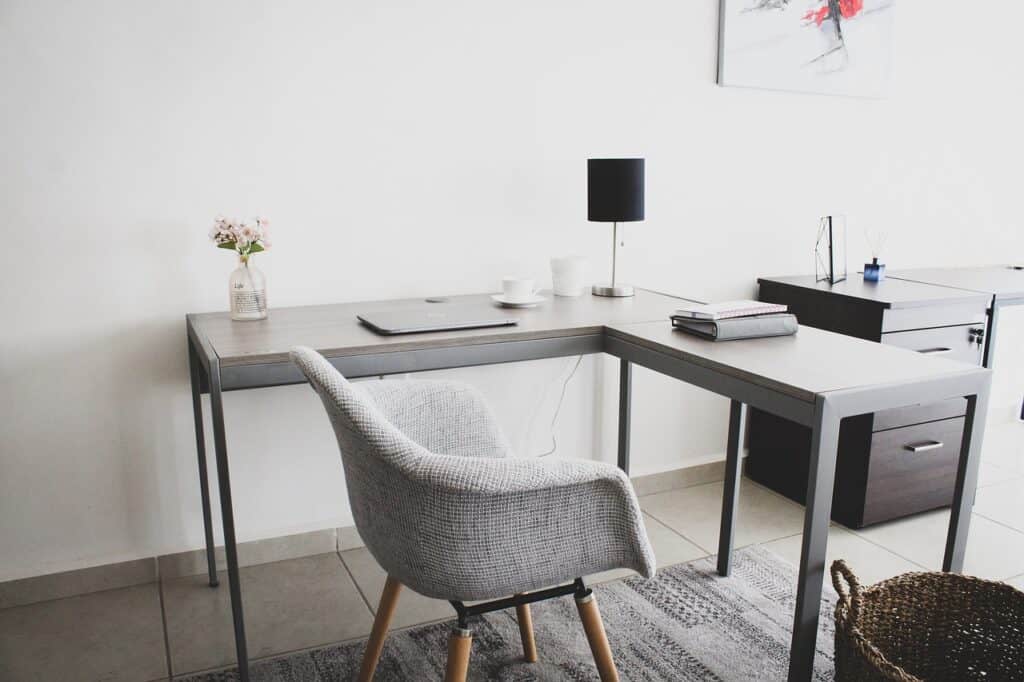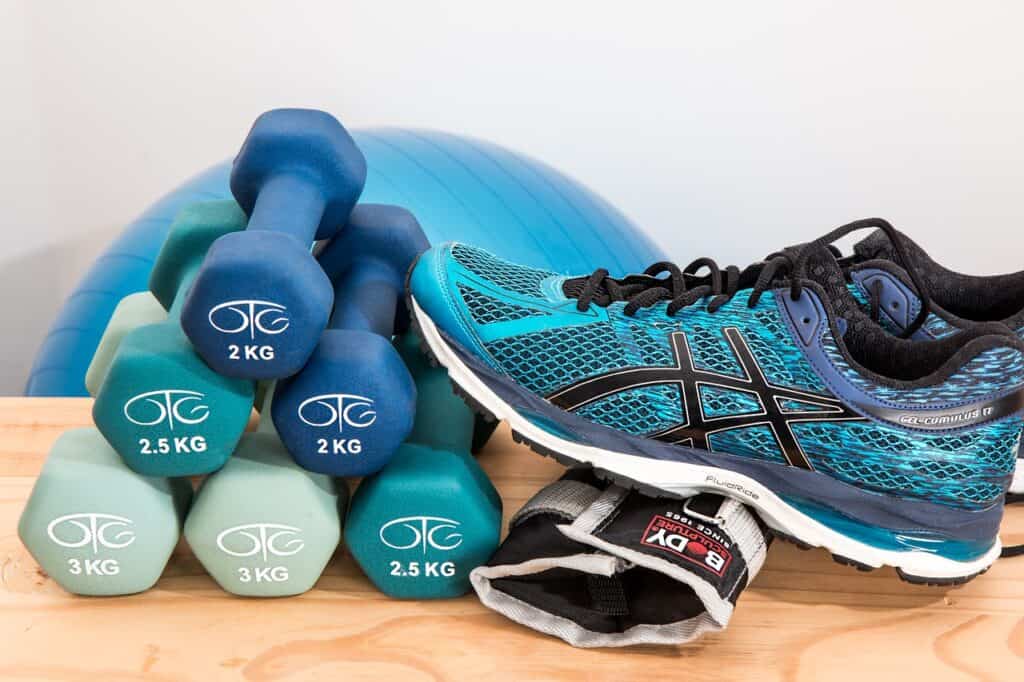Working from home boosts your productivity and promotes a healthy work-life balance -– when you do it right. Even living that WFH life, your daily routine and environment matters, from your workout to your mood lighting. Not sure where to start? These 11 healthy habits for working from home will keep your output high, bosses happy, and mind and body strong.

1. Keep regular hours
Working from home invites more flexibility into your life. Wielding this power frivolously, however, risks sabotaging the quality of your work and your downtime.
Personally, I’ve learned that not abiding by regular hours means I’m often finishing up at midnight. But you also don’t want to overwork yourself just because you have the time. If you don’t regularly destress and de-screen, you’re more likely to suffer health problems or career burnout.
The solution: Create a schedule that works for you, and stick to it. For some, that means holding normal office and break hours. Personally, I “block” time more loosely. Between 10am-10pm, I shoot for 7-8 hours of work, not including breaks. Whatever your method, be sure you set an absolute “end time” to log off for the night.
2. Follow a daytime routine
It’s also wise to institute a daily routine as part of your regular hours. Sticking to familiar habits can:
- Reinforce the feeling of being “at work”
- Boost productivity and creativity
- Break up WFH monotony
- Prevent you feeling overwhelmed
For instance, you might make a point of “going” to work as part of your morning routine. Enjoy a hot shower, get dressed for the office, and eat a healthy breakfast. Maybe you have a cup of coffee or take the kids to school before zoning in.
Once you’re at work, visualize and check off your daily tasks with a weekly planner or desktop planner to stay on task. Take regularly-scheduled snack and lunch breaks to separate your time and rest your mind. Whenever possible, “log off” at the same time every day.
3. Make time for breaks
Sitting still for long periods can lead to body pains, poor circulation and increased risk of health problems. Scheduling regular breaks gives you an excuse to step away from the screens, exercise, and destress.
Make a point to move around to boost your energy and reorient your focus. If you have housework waiting, combine the two. Snack break? Start the dishwasher. Lunch break? Tidy the living room and take out the trash. Afternoon rest? Pop dinner in the oven.
In short: reinforce the habit of completely disconnecting from work (and knocking a few things off your after-work to-do list).

4. Dedicate a separate workspace
Four years post-pandemic, maybe WFH-ers are finally learning the importance of clearly separating their workspace and home space. Enforcing a physical distinction reduces distractions, boosts mental health, and makes it easier to clock in and out. Plus, you can write off the space on your taxes!
Ideally, you’ll have a spare room, basement, or backyard shed that easily converts into a dedicated workspace. If you lack a whole room, a corner of your bedroom, kitchen, or living room can also work. (Though you may want to invest in some heavy-duty noise-cancelling headphones to keep your focus.)
Importantly, don’t forget to decorate your office space with organizers, a desk mat, and a trio of fake plants for good measure! Those lacking the luxury of a door might also consider a fancy partition that clearly divides your workspace and home space.
5. Go ergonomic
Buying home office equipment isn’t just a tax write-off. The right ergonomic tools will make you a better, healthier, more creative worker.
For instance, a sitting-standing desk like this one lets you move around while keeping your computer screen the recommended 20-40 inches away. Budget-conscious workers may prefer a converter to turn your existing desk into a standing paradise.
Meanwhile, an ergonomic office chair promotes good posture and provides the support you need to stay focused. While it may take some getting used to, a proper ergonomic keyboard can prevent symptoms of carpal tunnel.
6. Use technology to keep on task (and on time)
Feeling unprepared to face your day, or too overworked to clock out, can lead to stress and general feelings of disorganization. Battle the burnout and take control of your day with the right project and task management tools. You have tons of options to choose from:
- Use an AI assistant and meeting scheduler like Reclaim.AI
- Break tasks into bite-size hurdles with Jira and Asana
- Track personal and professional tasks with Trello
- Manage your personal “to dos” with Todoist
- Maintain your work-life balance with Monday
No time to learn a new tool? No problem! Pair your device’s alarms, “Focus Mode,” and Google calendar to structure and schedule your day.

7. Add a little workout to your workday
Workplace benefits aside, the sedentary nature of remote work can negatively impact your mental and physical health. Keep a little wiggle in your work with simple steps like:
- Shifting positions every 15-30 minutes
- Scheduling stretch breaks every 1-2 hours
- Doing lightweight or body weight exercises during long meetings
You might also invest in some handy gadgets to stay active. Weighted jump ropes and fitness hoops make it easy to have fun between meetings. Walking treadmills and under-desk ellipticals keep your legs moving through most any workplace task. A yoga ball chair will engage your core all day long.
Whatever your preferred physical activity, make a point to get your blood pumping at least a few minutes every hour.
8. Insert clear transitions between work and home
Traditional workers often have a commute – even just a short walk – to signal the close of their working day. Working remotely, however, doesn’t come with a built-in transition. So, you’ll have to create your own.
Designating a specific work area in your home is a great start. But you should also establish several “wrap-up” practices, like reviewing tomorrow’s schedule, putting away your laptop, and changing your clothes. You might even leave the house to hit the gym or pick up the kids for more thorough separation.
As in many other areas of life, it’s the small steps that make a really big difference.
9. Stay social
Living and working behind screens day-in and day-out can feel suffocatingly isolating. Staying tangibly tethered to your social circle can reduce feelings of loneliness and anxiety and even improve your work.
Start by connecting with your co-workers via phone, video, or even in person once in a while. After work, go out for drinks with friends, join a hiking or birdwatching group, or take a painting class. Invite your buddies over for low-key game nights. Get involved with your child’s school. Stay active in your religion through attendance and volunteer opportunities – or donate your time to a non-religious charity of your choice.
Even if it feels daunting to go be “on” outside the house, your mind (and performance metrics) will appreciate the human connection.
10. Eat well on the clock and off
Modern convenience and good nutrition don’t always mix. Candy, chips, and soda may taste good, but they wreak havocon your physical health.
Instead of snacking easy, aim to snack healthy. Use your weekends or after-work hours to prep veggies, prewash fruit, whip up a cheese board, or prepare your own trail mix. Throw together dinner for the week and freeze it in small batches.
Proper hydration also matters. Drinking enough water can reduce snackishness, improve cognitive performance, and keep your heart healthy.
Don’t worry about chugging one of those gigantic “encouraging” bottles each day. (Unless you want to.) Just keep a glass on hand for sips between meetings and emails. Enjoy a cup of stress-relieving tea after tough tasks. Blend snacktime and hydration by crunching on celery or strawberries to stay refreshed and on your A-game.

11. Don’t forget about a good night’s sleep!
Top off your workday with a good night’s sleep to stay well-rested for tomorrow’s tasks. If you have trouble sleeping, you may benefit from a nighttime routine to signal the day’s end.
Start by unplugging at least 30-60 minutes before bed. Reduce stress with relaxing aromatherapy, a facial mask, or nighttime tea. Unwind with a chapter of a book, some light stretches, or some soothing sounds with comfy sleep headphones. However you relax, take the time to enjoy your time – and to keep healthy working from home.

